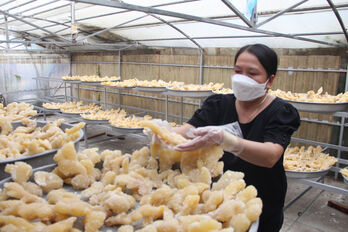
A paddy field in Phu Yen province (Photo: VNA)
According to data from the Vietnam Food Association (VFA), export rice prices of Vietnam are moving sideways after sharp decreases. The price of 25% broken rice dropped by 20 USD per tonne in the past week to 584 USD per tonne and 5% broken by 19 USD to 609 USD, slightly lower than Thailand’s. Meanwhile, 100% broken rice is at 508 USD per tonne, 25 USD per tonne higher than Thailand’s.
Rice prices are dropping on the psychology of waiting for clearer market trends from rice import plans of importing countries.
In addition, the main Winter-Spring crop, typically with good rice quality and output, is coming in two weeks, which will significantly impact the trend of rice prices, according to agriculture expert Hoang Trong Thuy.
Enterprises are waiting for the coming harvest season to prepare for their signed contracts and set price frames for their export contracts in the second half of the year.
Farmers also tend to wait for better points of time to sell their rice with expectation for higher prices, while the El Nino is increasing worries about global rice support.
The US Department of Agriculture has lowered its forecast for global rice supply in 2023-2024 crop by 4.5 million tonnes from the previous forecast of 518 million tonnes. Meanwhile, the demand is estimated at 522 million tonnes, meaning a shortage of around 4 million tonnes which will keep rice prices at high levels in 2024.
Thuy also said rice importers know that Vietnam was entering the largest rice harvest of the year so they were not in a hurry to buy, but waiting for good prices.
The psychology of waiting would continue for a short time. However, the upward trend of rice prices would continue in 2024 on limited supply from India’s rice export restrictions and the impacts of El Nino on farming.
Go sustainable
"The important thing is how to harmonise benefits among farmers, exporters and the nation,” Thuy said, pointing out that the roles of exporters were critical.
In fact, few enterprises are capable in terms of capital to stock rice. It’s necessary to increase lending and create favourable conditions for enterprises to access credit at reasonable rates for rice purchases, which will help them to be more active in ensuring supply sources for exports and in establishing relationships with farmers, according to Thuy.
Farmers should also be provided with support in terms of payments for fertilisers and pesticides for production in the context of rising input costs.
A combination of solutions would help the rice industry to develop sustainably, he said.
Nguyen Nhu Cuong, Director of the Department of Crop Production under the Ministry of Agriculture and Rural Development, said Vietnam targeted to maintain 7.1 million ha of rice cultivation in 2024 with a total output of 43 million tonnes and export at least 8 million tonnes.
According to Seasia Stats, Vietnam is the third largest rice exporter in the world with an export volume of 7.6 million in 2023-2024, coming after India with an export of 16.5 million tonnes and Thailand with 8.2 million tonnes.
Latest updates of the General Department of Customs showed that Vietnam had exported 663,209 tonnes of rice as of February 15 to earn a total of 466.6 million USD.
The average rice export price was 703.50 USD per tonne, 33.65% higher than the same period last year.
In 2023, Vietnam earned 4.68 billion USD from exporting 8.1 million tonnes of rice, representing increases by 35.3% and 14.4% against 2022.
ASEAN is the largest rice export market of Vietnam, accounting for 61% of the country’s rice export volume. Vietnam’s rice is also exported to China and Ghana./.
VNA
Source: https://en.vietnamplus.vn/falling-rice-price-is-only-shortterm-upward-trend-to-continue-experts/280103.vnp
 Diversify goods and agricultural products to serve the Tet market
Diversify goods and agricultural products to serve the Tet market



